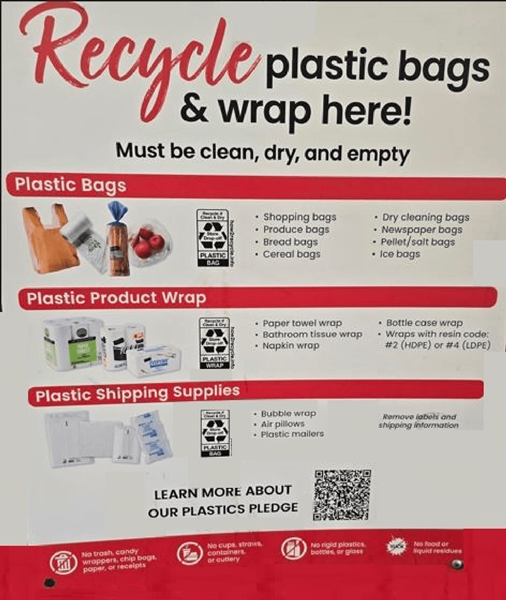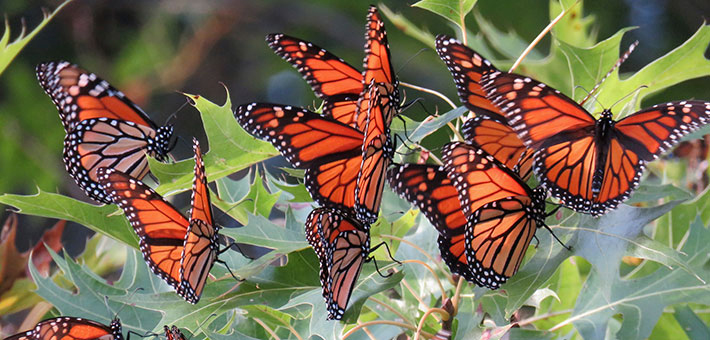
The Village of Franklin Park is committed to innovative sustainability practices. The Village has built a LEED Gold Certified Police Station, replaced outdated vehicles with energy efficient electric vehicles and installed charging stations at Village Hall and the Metra train station. The Village encourages residents to fully utilize the existing community-wide recycling program and has increased the amount of recycling per household from 8.2 to 10.9 pounds per week. A new anti-idling policy restricts police vehicles from idling on area streets. This eliminates the release of 27,818 metric tons of greenhouse gas emissions into the atmosphere annually. The following awards recognize the Village of Franklin Park for its achievements in sustainability:
- Governor’s Sustainability Award (2014)
- Green Intelligence Award (2014)
- Metropolitan Water Reclamation District’s (MWRD) Sustainable Landscaping Award (2014)
- Midwest Pesticide Action Center Individual of the Year (2013)
0
These plastics can be recycled at your local Jewel-Osco store. Please don't throw recyclables in the trash.

0
Village Receives Tree Grant for 2024
The Village has been awarded a $109,770.00 sub grant by the Morton Arboretum’s Chicago Region Trees Initiative to improve our urban tree canopy! The funding will allow the Village to purchase and plant 140 diversified species of trees, to train staff in the care of trees, and promote the benefits of trees to residents. From helping to mitigate flooding to reducing urban heat islands, community forest projects like this make neighborhoods greener and have many important benefits. Funding support for this project was provided by the Inflation Reduction Act through the Urban and Community Forestry Programs of Illinois DNR and US Forest Service.
EARTH DAY 2024 Goal is to Eliminate Plastic
In Franklin Park, we treat every day like Earth Day, protecting our planet, increasing our sustainability, and respecting the earth’s resources.
On Earth Day, the world pauses to focus on environmental education, awareness, and action. This year’s focus is to work to eliminate plastic usage and contamination through shopping sustainably, participating in cleanups, and practicing climate literacy.
Plastic breaks down into microplastics and releases toxins that pollute the air and water. Plastic destroys environments, greatly impacts species survival, increases global warming, and impacts human health. Studies reveal that unless we mitigate the use of plastic, cancers and cardio vascular disease will rise. But we can be a part of solutions that will mitigate plastic pollution:
Be aware of packaging when shopping and do not buy single use plastics. Support products that are packed in recyclable or reusable materials.
STOP - just stop - using plastic shopping bags. There are reusable cloth bags and recyclable paper bags available.
Franklin Park Awarded Urban Forestry Funding
The Village of Franklin Park was awarded a $15,000 grant to complete tree inventories and develop a management plan for its urban forest.The funds were provided by the United States Department of Agriculture (USDA) Forest Service through the Illinois Department of Natural Resources (IDNR) Urban and Community Forestry Partner Grant Program and administered by The Morton Arboretum and the Chicago Region Trees Initiative (CRTI).
The Village’s long-term commitment to the planting and caring of trees has created a beautiful and diverse urban forest in Franklin Park. The CRTI grant allowed the Village to complete a total tree inventory of the parkway trees in Franklin Park and develop a plan for the maintenance of the trees.
The grant provided the Village with a better understanding of the urban forest areas being managed by revealing an estimated number of trees, their size, condition, and species. The inventory also helped to identify opportunities to increase planting, and will inform the development of a comprehensive, long-term urban forest management plan.
Having a diverse urban forest makes it more resilient and planting a diverse array of tree species helps to prevent disease and to protect from loss of trees. Our goal is to not have more than 5% of one species planted in our community.
“Urban trees are critical infrastructure for a community, and this funding helps to protect one of its most important resources,” said Lydia Scott, director of CRTI. “Trees clean our air and water, reduce flooding and heat, improve our mental and physical health, and provide important habitat for birds and other wildlife.
0

Spring is the Time to Switch to Natural Lawn Care
According to the U.S. Fish and Wildlife Service, homeowners use up to 10 times more chemical pesticides per acre on their lawns than farmers use on crops. When it rains, the pesticides and fertilizers you put on your lawn can be carried by runoff and end up contaminating a stream or wetland dozens of miles away. Contaminants can also be carried for long distances through the air and deposited on land and in water by rain or fog.
Caring for your lawn in an environmentally sensible way can have a bigger impact than you might think. Unlike conventional lawn care, which relies on chemical fertilizers and pesticides to artificially green your lawn, Natural Lawn Care focuses on restoring balance to the soil system to make a lawn healthy. Over time, your lawn will become naturally healthy, green, and beautiful. It will also require less watering, fertilizing, and mowing, saving you time and money!
How to make the switch:
- Choose non-chemical weed controls whenever possible.
- Mulching, spading, hoeing, and pulling up weeds are good ways to avoid weed growth rather than applying weed killer.
- Fertilizing more than the recommended rate does not help plants grow better and often harms them and excess fertilizer will likely wash into streams and rivers killing some species of amphibians.
- Leave the grass clippings from mowing to decompose on your lawn (feeding your lawn this way is equal to fertilizing it once or twice a year).
- Use compost in your garden to develop healthy soils and reduce the need for chemical fertilizers.
- Have your soil tested to find out exactly what nutrients it needs to avoid applying unnecessary fertilizers.
- Use organic fertilizers rather than synthetic ones. Organic fertilizers release more slowly into the environment and create healthier soils.
- Apply fertilizer when the soil is moist and lightly water. This will help the fertilizer move into the root zone.
- Minimize the attraction of pests such as rats, therefore reducing the need for pesticides, by moving wood piles away from the house and clearing away weeds, litter, and garbage.
Corn gluten, the by-product of corn processing, contains proteins that inhibit root growth during seed germination for several small-seeded annual and perennial weeds including crabgrass. This product offers a natural herbicidal alternative to toxic “weed and feed” lawn products and contains a significant amount of nitrogen that our full-grown turf grass loves.
Corn gluten is most effective when it attacks a weed just before germination or sprouting. Apply corn gluten in early April or when forsythias begin to bloom. Choose a product with a high protein content for the most effective results. Check the weather forecast and apply it when it will not likely rain over the next few days. Wet the corn gluten with a soft spray and you are ready to start suppressing weeds! Note that corn gluten will also suppress the germination of turf grass seeds, so either plant these seeds in locations away from corn gluten application or wait four to six weeks after for its herbicidal effects to wear off. You can likely find corn gluten products in the “weed n’ feed” section of your local garden center or online.
To learn more, go to Natural lawn care
0
.jpg)
Consider Solar Panels
Home and business owners can do good for the planet and their pocketbook by installing solar panels. The cost of solar panels has decreased by more than 80% in the last ten-years making them more affordable. In addition, a federal tax credit and a property tax exemption for solar panel systems can help to make going solar a viable and attractive option in Illinois. To learn more about the Village’s process and checklist for installation:
Solar Panel Installation Requirement
0

Beehive Installation Helps Out Village and Our Planet
To further support our sustainability efforts, the Village has installed five beehives on the rooftop of the Water Department Garage. Bees play a crucial role in our ecosystem pollinating many fruits, nuts, and vegetables, which are 90% dependent on bee pollination. The flowers we enjoy would not be here without active healthy bee colonies. One bee colony can pollinate 300 million flowers a day. And then there is all the honey that can be collected too!
Protecting the bee population is critical. More than 100 crop species provide 90% of food worldwide and of those crops, 71 species must be pollinated by bees. Without bees, our global food supply would be extinguished. Read more:
https://www.chicagotribune.com/suburbs/franklin-park/ct-fhj-beehives-tl-0617-20210615-5xew2zfirbemflshls5spxhj4i-story.html
0


Plant Milkweed to Support Monarch Butterflies
More than beautiful, monarch butterflies contribute to the health of our planet. Our food supplies and ecosystems depend on healthy pollinator populations. Unfortunately, the monarch butterfly populations have declined by 90% in the last 20 years! Changes in climate have resulted in more out-of-season storms, severe temperature drops and excessive rain. The combination of both wet and cold is deadly and has resulted in the deaths of hundreds of millions of butterflies.
But it is not too late to get involved in monarch conservation and help to protect their migration for future generations. Start by creating a habitat for monarchs by planting native milkweed to feed caterpillars. Milkweed is the single most important source of food for the threatened monarch butterfly. By planting a patch or two in your garden, you will contribute to the continued existence of the species. The butterflies use the plants for all stages of their lifecycle, beginning with hatching their eggs into tiny caterpillars, to transforming into butterflies, and for laying new eggs.
Plant as much as milkweed as possible to fuel monarch feeding and breeding. Try to include at least six plants. Provide a nearby water source for your butterflies; a birdbath or a large potting saucer filled with water. Planting other pollinator-friendly plants in a comprehensive butterfly garden is a good idea. Milkweed spreads aggressively and may not be ideal for most mixed border gardens unless you are specifically creating a butterfly garden.
Do not use pesticides in a butterfly garden! Once a garden goes chemical-free, it establishes a good balance of beneficial, predatory insects, as well as providing songbirds with a source of food. Many of the healthiest gardens are those that are entirely free of chemical use. Go to plantmilkweed.org to learn more about creating habitat for monarchs.
Take the Pledge to Help Save the Monarch Butterfly
The Metropolitan Water Reclamation District (MWRD) wants you to help save the monarch butterfly from extinction. They are offering free milkweed seeds (while supplies last) to Cook County residents willing to take the pledge to save the monarchs. Milkweed plants benefit monarch butterflies and other pollinators throughout the growing season. Take the pledge at mwrd.org/form/monarch-butterfly-pledge
0